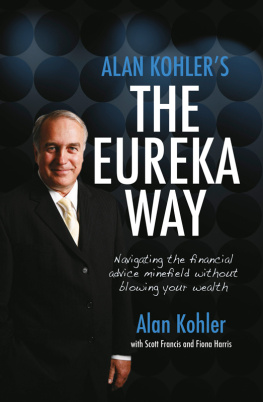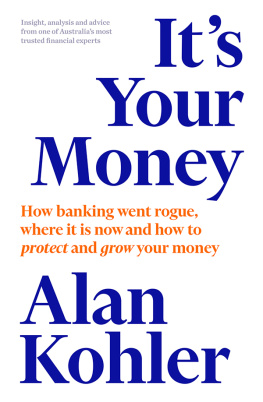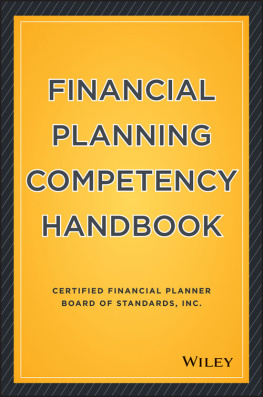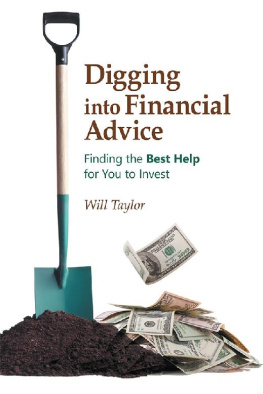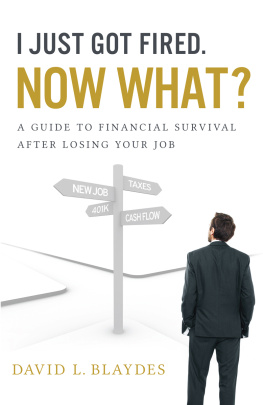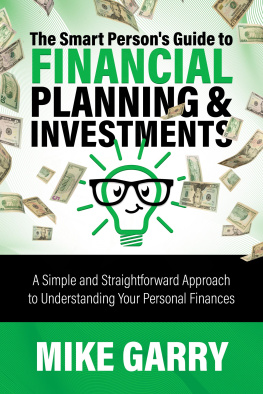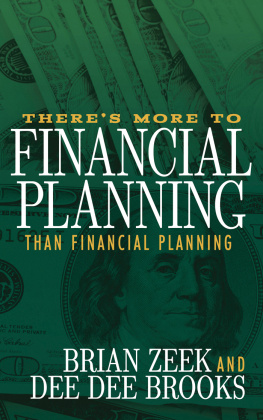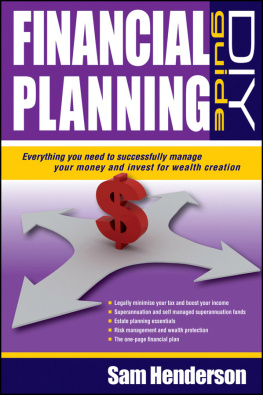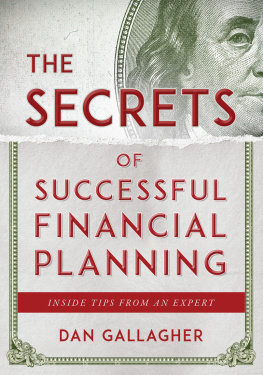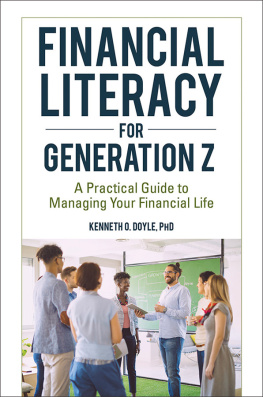Contents
Defining the problem
How financial planning works
Who are the financial planners?
Your responsibilities
Contact the financial planning firm and ask for an initial appointment
The first appointment
Statement of Advice
Statement of Advice presentation meeting
Implementation
Expectations of an ongoing relationship
The limits and pitfalls of advice
Platforms and wraps
Managed funds
Superannuation
Doing it yourself
Investing is all about the riskreturn trade off
Use the power of compounding
Diversify to reduce risk
Choose investments you are comfortable with and which meet your needs. When in doubt, get advice
Dont forget tax
Invest in what you understand
Its the people in a business that matter
Remember the importance of long-term trends
Building wealth is about time in the market, not timing the market
Asset allocation is king
Property advice
Half-truths, flawed thinking and misrepresentations
Most of us find our brains go to mush when it comes to thinking about our finances. We may have confidence to have a go at running a business or teach classes but when it comes to managing our money, we think we know our limitations. So millions of us serve ourselves up to an industry waiting eagerly to reassure us and to relieve us of our money: the financial services industry, particularly financial planners.
The stakes are very high indeed. Australians have almost $1 trillion (a million million dollars) sitting in superannuation funds these days and theres plenty more invested outside super as well, in property and shares. Its the era of self-reliance, of super choice and do-it-yourself (DIY) investing of accumulation-type funds, which means how you will live in retirement depends on how well you invest your money while you are working.
Most of the money put aside by Australians for their retirement, or invested for income after retirement, passes through the hands of a financial planner or some other part of the financial services industry. This is virtually forced on us by the complexity of the savings system set up by the government. Whats more, the government helps to create the illusion of safety through a massive regulatory infrastructure.
Yet this is an industry riddled with conflicts of interest created by sales commissions and unholy relationships between advisers and the promoters of financial products. It is impossible to tell whether your adviser is acting in your best interests or simply selling you something.
This book sets out to explain how the financial services industry works and to help guide you through the challenges you may encounter in dealing with the financial planning industry. We are not against financial planning itself. In fact, we think nearly everyone should get advice at some time. But the advice should be better, more impartial, and cheaper.
Many financial planners are good at what they do and truly add value for their clients. The trouble lies not with individuals, but with the system. We are against a system designed to extract percentage fees from investors and seriously erode their savings in the process. This is highway robbery.
We believe the regulation of financial services in Australia is totally inadequate. Incompetent, conflicted, and sometimes corrupt, advisers are getting away with murder. And even if by some miraculous regulatory intervention the conflicts of interest from sales commissions could be removed, there are other more fundamental problems. The percentage fees charged for all financial services (not just financial planning) are too high and they are bleeding our retirement savings; and the service and expertise being provided for that money is patchy, unpredictable, and too often just plain bad.
Actually these are really just parts of one overriding problem: that the value for money of financial services is neither good enough nor reliable enough, and those of us who are getting help to save and plan for retirement, or who have already retired and need to live on their savings, are too often being badly served.
Retirement investment products are marketed with slick slogans and extravagant claims about a better tomorrow. But there is no tomorrow worth having for many who sign on to some of these so-called safe investments. The disastrous Westpoint collapse of 2006 is no longer in the news, but we should never forget what happened and the thousands who lost everything because of bad advice.
In some ways, however, the danger of a big financial collapse is the least of our problems. The leaks, the small mistakes, the fees and the avoidable taxes are costing Australians millions every year. You may think that your financial plan is fine, but it is probably full of money leaks and excessive charges, as well as tax time-bombs that wont explode until you go to withdraw income. And thats assuming you even have a financial plan which is not just a sales document that sells you entirely up the river.
Retirement saving is a game of inches, in which getting your fees and charges down by a few points can make a huge difference to your end result the difference between spending much of your retirement in the Whitsundays sipping mint juleps, or just sitting miserably in your backyard watching your budget and sipping tea! Given that the returns are largely a matter of how the markets perform, and that most investment managers produce much the same results, the fees are the most important thing you can control.
But how often have you had a conversation with your financial planner about how to get your fees down? This should be the first priority of any financial adviser, yet all too often in search of fraudulent illusory promises of higher returns they simply ensure that your fees go up instead.
The stakes are enormous. Unfortunately, thats because we, the members of the current generation of savers and retirees, are the guineas pigs for a massive government experiment: the privatisation of retirement saving. The old era of company-or government-guaranteed retirement income has given way to a new era of enforced self-reliance and although the sharemarket boom of the past three years and the added super tax benefits in this years budget, has made the whole thing seem like a soda its not.
Retirement is one of the most complicated jobs youll ever undertake; a constant battle against hidden fees, higher taxes, rising inflation and complicated investment products. The shift to self-reliance has become necessary because of the ageing of the Australian population. Its probably a good thing, but even that cant be taken for granted, especially if we end up going through a bad time on investment markets. The past few years have been fantastic for investors in Australia, but how long can it last?
There are two reasons why responsibility for retirement saving has been forced upon us by corporations and governments. It isnt just because of the ageing of the population and the extra financial burden of growing numbers of retirees. Its also because corporations and governments no longer want to bear the market risk inherent in guaranteeing employees with a certain standard of living in retirement. This trend started after the oil shocks of the 1970s, which produced a once-in-a-generation spike in inflation and then interest rates, with subsequent inevitable market volatility.
Before the end of the 1980s, boards of directors and government cabinets were making plans to shift market exposure back to employees. As it happens, this has coincided with an unprecedented period of prosperity and stability a bull market which has lasted for 16 years (accelerating in the past three years, after a pause following the internet bust).

